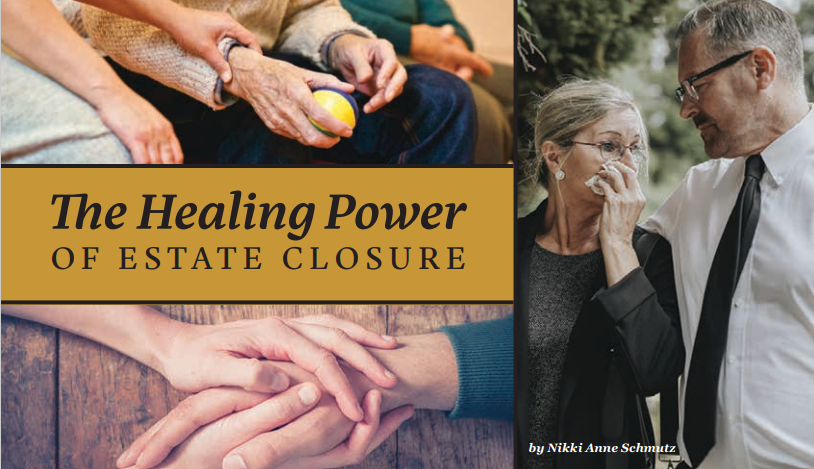(404) 312-6640
The Healing Power OF ESTATE CLOSURE
Many funeral directors wonder if it’s their responsibility to help their families with estate matters. It isn’t something that has regularly been done in the past. Usually, efforts in this area are ultimately geared towards preneed sales - and rightfully so. Preneed is one of the driving forces in the death care industry. So, why should estate help be something funeral homes offer? Think for a moment about the recent changes to traditional funeral service over the past few years… the trends suggest more and more people are moving away from tradition and choosing cremation, non-traditional services, or private gatherings for scattering. Staying relevant in a changing world will require out-of-the-box thinking. What services can a funeral home offer if people aren’t choosing traditional services? One answer is an aftercare program that focuses on estate matters. Losing a loved one is an emotionally overwhelming experience, and grief can manifest in various ways. Amidst the pain and sadness, there lies a practical aspect that often gets overlooked in the initial stages of mourning – estate closure. Engaging in tasks related to settling a loved one’s affairs might seem daunting, but it can be a crucial step in the healing process. There is an indelible connection between taking care of estate closure tasks and the alleviation of grief after a loved one’s passing. Many families put off tasks for months or even years, which can cause many problems for the surviving family members.
DISTRACTION AND FOCUS Estate closure can provide a necessary distraction from the intense emotions associated with grief. The myriad of tasks involved, such as handling paperwork, organizing assets, and communicating with relevant parties, requires focus and attention. This shift in focus allows individuals to temporarily step away from the all-encompassing sorrow, providing a respite and helping to break the cycle of overwhelming grief.
A SENSE OF CONTROL The aftermath of losing a loved one can often make individuals feel helpless and out of control. Engaging in estate closure tasks provides a structured framework where individuals can actively participate in the process of organizing and settling affairs. Taking control of these responsibilities, no matter how small, can empower individuals to navigate the challenges of grief more effectively, contributing to a sense of autonomy during a time of emotional upheaval.
CLOSURE AND COMPLETION The completion of estate closure tasks symbolizes the closure of a chapter, both practically and emotionally. Wrapping up legal and financial matters, distributing assets, and finalizing affairs can provide a tangible sense of closure that aligns with the emotional journey of mourning. It allows individuals to acknowledge the reality of the loss and gradually move toward accepting the new normal without their loved one.
HONORING THE MEMORY Many estate closure tasks involve decisions and actions that can be directly linked to honoring the memory of the deceased. Distributing assets according to their wishes, donating to charitable causes they supported, or preserving and organizing personal belongings are ways to pay tribute to the life and legacy of the departed. By engaging in these activities, individuals can find solace in the thought that they are continuing the legacy of their loved one.
SUPPORT NETWORK AND SHARED RESPONSIBILITY Estate closure often involves collaboration with family members, friends, and professionals, fostering a sense of shared responsibility. The collective effort in handling these tasks not only lightens the load for individuals but also strengthens the support network. Interacting with others who are going through similar experiences can provide comfort and companionship, reinforcing the idea that one is not alone in the journey of grief. Families greatly benefit from the help of professionals as they walk this path.
SERVICE-BASED AFTERCARE There is a growing number of funeral homes that now offer “Service-based Aftercare”. This new industry term refers to an aftercare program that provides more than cards, texts, or phone calls to check in on the family during the year after passing. Service-based aftercare offers comprehensive help with estate matters and notifications to provide peace of mind and allow the family to deal with grief without worrying about all the next steps. This can be done by a staff member who meets with every family, or by a company like Full-Circle Aftercare which partners with funeral homes to provide comprehensive support to every family who uses the funeral home. Going above and beyond is a great way to create loyalty and an impression that will last. While grief is a deeply personal and unique experience, attending to the practical aspects of estate closure can significantly contribute to the healing process. Engaging in these tasks offers distraction, a sense of control, closure, and an opportunity to honor the memory of the departed. Moreover, the shared responsibility among a support network can provide comfort and companionship during a challenging time. As individuals navigate the complexities of estate closure, they may find themselves on a path toward healing and eventual acceptance of their loss.
Nikki Anne Schmutz is the Director of Operations at Full-Circle Aftercare. She was born and raised in Utah. She is a published writer and has spent many years working with special needs children and adults as a caretaker and Registered Behavior Technician (RBT). In 2019, Nikki joined Full-Circle Aftercare, where she has been happily directing her funeral home and hospice clients (and their families) through the maze of non-legal personal estate settlement.






Comments